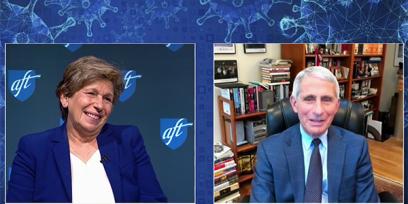One of the nation’s most trusted experts on the coronavirus pandemic, Dr. Anthony Fauci, joined AFT President Randi Weingarten on July 28 for a virtual town hall on Facebook Live to answer questions from AFT’s educators and health professionals. The questions ranged from how to approach the reopening of schools to the possibility of a COVID-19 vaccine.
Fauci, who is director of the National Institute of Allergy and Infectious Diseases, kicked off the session by letting viewers know that the pandemic is still evolving and there are a lot of unanswered questions; but he promised to provide answers based on the data and information that experts know at the moment. “We do know a lot, but we need to be humble enough, and transparent enough and flexible enough to be able to change when appropriate the kind of recommendations we make,” said Fauci.
On the question of reopening schools and the essential conditions that should be in place for a safe return, Fauci said there is no one-size-fits-all solution. “What might be good in one county, one region, one city, one state, might not be the same for all …. The default situation should be that we should try— to the best of our ability—to get the children back to school,” he said.
One reason Fauci would like to see children back in school is the “unintended ripple effects” for families, who noted that the social isolation caused by school closings has been hard particularly on children. But he also cautioned that, “paramount among all of this is the safety, the health and the welfare of the children, of the teachers, of the school personnel and … the families of those people.”
Because many young people are asymptomatic, “people will not know they are infected,” said Fauci. He explained that schools will need to have the availability of testing for children and contact tracing to respond quickly when someone becomes sick.
And because schools switched to remote learning relatively early in the pandemic, we don’t know what to expect when schools reopen. “Unfortunately, though this may sound a little scary and harsh, … you’re going to be part of the experiment—of the learning curve—of what we need to know,” said Fauci.
Weingarten posed a question from a healthcare worker in Ohio who wanted to know about the long-term health effects from contracting COVID-19.
Fauci cautioned that some people who had a severe infection—those who were in bed for three to five weeks or were hospitalized and required oxygen—are experiencing ongoing health problems. “We’re finding out that the effects after you recover from the initial infection can be substantial; they can be chronic and subtle. … We’re starting to find out that there are some abnormalities of the heart, of the neurological system …. [But] we don’t know how long those bad effects are going to last,” said Fauci.
Moving the discussion to how the virus spreads, Weingarten asked a question from a school bus driver in Houston who wanted to know about exposure from students who are not wearing masks.
“As a school bus driver, you should be wearing a mask—no doubt about that,” said Fauci. Students should, too, Fauci added, because masks help prevent people from giving COVID-19 to others.
Continuing on the subject of masks, an AFT member asked why Fauci changed his view on the wearing of masks in the first few months of the pandemic.
“That’s a fair question,” said Fauci, who pointed out that he and others went with the best scientific data at the time, noting also that they were concerned about people hoarding masks.
But then, said Fauci, a few things happened to sway him: The mask shortage ended; new data revealed that 20 to 40 percent of infected people were asymptomatic but transmitting the virus; and data from other countries showed that masks work as a preventive measure. “When the scientific data changes, it’s important to be flexible enough to change your recommendations,” he said. “Masks actually do work.”
Weingarten then asked Fauci for advice regarding personal protective equipment for teachers when they return to school. Fauci acknowledged there is no perfect answer to that question but said that teachers don’t need to go to school in full PPE. “The people who have the full PPE know as a fact they have a sick person who clearly is secreting virus …. The minimal [for teachers] would be the mask, eye shield (if you can have it) and possibly gloves—but washing your hands frequently, having Purell there if you don’t have a sink nearby, is as good as wearing gloves,” he said.
Looking further ahead, Fauci said he is cautiously optimistic that we will have a vaccine by the end of the year or at the beginning of 2021. He noted that unions like ours, which represents healthcare workers, can play a role in helping hospitals and communities to be better prepared for the next pandemic.
He recommended using the power of the union to demand that the country be better prepared. “Billions of dollars are being spent right now on the response to COVID-19. We want to make sure that that money is well spent …. You’ve got to say, as the frontline people, the nurses and the healthcare professionals, that that’s your lane,” said Fauci. “Hold feet to the fire of the local authorities—and the federal authorities—that they make sure that there is in place good pandemic preparedness.”
Weingarten and Fauci closed the session on an encouraging note. When asked what gives him hope, Fauci responded that it is the resiliency of the American people. “I have lived through six administrations and multiple outbreaks.” But he knows, deep down, that “if we pull together, we can end it.”
[Adrienne Coles]

